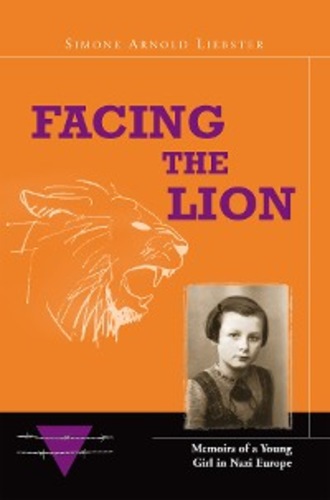
Полная версия
Facing the Lion
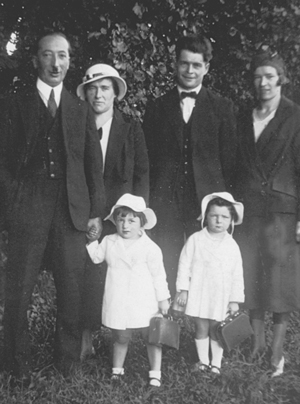
After dessert, Angele and I would go out to play. I’d make a doll from a little round potato, two tiny stone eyes, a stick fixed to a carrot body, with a big leaf serving as a dress. My city-girl cousin didn’t appreciate my doll. She soon would lie down and close her little blue eyes. Her red eyelashes looked like a hand-stitched seam; her mouth shrank and looked like a strawberry. Her round red cheeks surrounded her tiny freckled nose while her beautiful curly locks spread over the green grass like rays of sunshine. In her light-blue dress with her ribbons, she became my doll.
My doll needed my care. I would search for a big leaf to make an umbrella, then I too would lie down under the fern enjoying its familiar scent. I lay there, listening to the buzzing bees, watching the rolling clouds, once in a while catching sight of a grasshopper. I would think about the adults’ conversation and try to figure out what it meant.

Grandma had given me another picture of a holy image to add to my collection. Father’s round face stretched long. He raised his eyebrows, pulling his eyelids up, while his lips rounded into a dot. I saw a question mark on his face. Mother’s face was neither serious nor smiling. The corners of her mouth drooped and her eyes were drawn inward. She waved her right hand a little bit, spreading all five fingers. Obviously, they were not enthusiastic about my holy image!
“Put it in your missal,” Dad ordered. I had received a white pearly missal—my own prayer book— before I had started school. I replied with a determined, “No.” That image had been blessed by the priest and was given to me by Grandma. I wanted to make it part of the altar in my room. “Grandma said it will chase evil spirits away,” I protested. “She even put a few like it over the doorway of the shed!”
Father didn’t insist. He let Mum have the last word, which meant that I could put the image on my private altar. It was good that way. Ever since she bought her new sewing machine, Mum used my room for sewing. She would benefit from the protection of the saint who dominated my altar.
Sitting on the floor with my teddy bear, I was fascinated by the big wheel of the sewing machine that Mother worked with her feet. No one could do it faster than my mother! I loved the sound of the sewing machine and Mum humming. I was inspired by the sight of fabric turning into beautiful clothes and wonderful shirts that made Dad look like a great man.

JUNE 1936
One day, Mother was not humming. She dragged her feet as she walked, and she would stop once in a while and put her face in her hands! She got up and looked out the window. When I asked, “Mum, are you sick?” she shook her head, and turned away. I sat down next to her; she stroked my hair.
Dad left at 1:30 to work the afternoon shift. I waited in vain for Mother to play with me as usual. Bedtime arrived. She came to my room and had me take holy water and make the sign of the cross. Then she said a prayer and kissed me while tucking me in.
Mum would usually close the shutters, but this evening she sat at the edge of my bed. Slowly the night fell and the moonlight shone on my mother’s black wavy hair. Her ivory complexion became even whiter. I couldn’t see her deep blue eyes, but I felt them. Slowly, her silhouette vanished. I fell asleep. It was eight o’clock, my regular bedtime.
Most nights I would wake up at a quarter past ten to the hum of bikes as the workers came home from the factory. I would hear Dad stowing his bicycle in the garage, climbing the creaking wooden staircase, turning the key, and opening the door ever so quietly. My dog, Zita, slept next to the entrance by the toilet, and would jump high up to Dad’s waist and follow him to the kitchen. There, Dad would take off his shoes, put on his slippers, and hang up his jacket. This was the signal for me to pull my bed cover over my nose and squeeze my eyes shut. Then came the delightful moment when Dad would enter my room, lean over me, his warm breath brushing my face, and place a warm kiss like a butterfly upon my forehead. His hands like a breath would caress my short hair. I would feel his loving gaze while I pretended to sleep, enjoying that exquisite moment to the full.
That night, I suddenly awoke with the distressing feeling that I was alone. I called out desperately, and Mother came running into my room in her nightgown, a hair net holding her wavy hair.
“Where is Dad? He didn’t come to kiss me.”
“Shhhh, it’s past three o’clock. Dad must be sleeping. You must sleep too!” She sat next to me stroking my hair, which was soaked by the sweat of my terror.
The following morning, Dad was not at the breakfast table, and there was not even a cup ready for him.
“Dad will be away for a few days,” Mother said, trying to hold back her tears.
Dad has left us! Dad has run away! That’s why he had seemed unusually quiet, sad, and tense. I remembered a conversation between him and Mum. “It was an error; it should not have happened,” he had said quietly to Mum.
“Adolphe, don’t worry; everybody makes mistakes.”
How could Mother accuse Father, saying that he makes mistakes? Dad never makes mistakes. I knew it! Dad must have run away from her.
Where did he go? He must have gone to Krüth, the village at the end of the valley. It was one of my favorite places. I wished I could have gone with him, to get away from my mean mother.
Krüth was where Dad’s stepfather and uncle, Paul Arnold lived. He was my “Grandpa-Godfather.” He would stand in the small doorway of his house, his right hand holding the door post, just underneath the stone-hewn cross with numbers on it. He would smile, his eyes disappearing in all those crinkles and wrinkles. He was so old and dried out, just like a prune! He rolled his trousers several times around his belt. I would like to have visited Grandpa-Godfather again.
Why didn’t Dad let me go along?
I sat in my room sulking. After a while, I started to cry.
“Adolphe, Adolphe, you’ve come home!” Mother’s excited voice woke me up. Was I dreaming? I jumped up and ran into my father’s arms. Mum quickly went back to the kitchen to prepare him a warm meal.
Dad explained what had happened. “The workers shut down the factory and stopped the printing plant without even taking the fabric off the presses! Everybody ran out, but the ones with white shirts had to go back in. Some were even beaten. No one could go in or out anymore.”[2]
“How did you get out?”
“I had decided to sleep among the fabrics along with the engineers. We could hear the workers’ threats and their slogans. It was quite frightening, I’ll tell you! At 2:00 p.m., I figured that my working crew—the printers, the men in the ink shops, and the engravers—would be at the gate. I went down. As soon as they saw me, they opened the gate. They said, ‘He is on our side in spite of his white shirt. Let him go home.’ But I needed their protection against the workers who didn’t know me.”
My father needed protection? He was afraid? He slept in a shop among ink and didn’t have spots on his shirt? So strange!
Father ate and talked all at once, using strange words. I had never seen him so agitated. His face turned red and his voice was tight. I was afraid that he might drop dead.
He continued his speech. Such strange words: proletarian, communists, socialism, slogans, claims, salaries, human rights, dominating class, confidence.
I got tired of listening to all that nervous talk. I went out onto the balcony. The kitchen light shone on the blue and white petunias and the red geraniums, but the night had silenced the birds and the bees.
“Daddy, look! The sky has put on its velvet evening dress with its diamonds.”
Dad finally stopped talking and came out; he lifted me up in his arms, while Mum took the dishes away.
“Simone, those diamonds are stars. They are very big, but they are far away.” Pointing to some of them above our heads, he added, “See those four stars in a square with three stars as a tail?”
“Oh yes, it’s a pan.”
“Those are called the ‘big bear.’”
“I can’t see a bear!”
“You can’t because we cannot see all the stars.”
“Oh, I understand—the bear is in the pan!”
From then on, I kept looking in the dark velvet sky trying to find the “big bear,” but every evening the pan stayed empty.

SUMMER 1936
During summer vacation, Mum and I went up to Grandma and Grandpa’s place. The summer slowly passed away, taking along the hot sunny days. Mum had almost finished her sewing work. Uncle Germain was happy with his new shirts, Grandpa was pleased with his new velvet trousers, and Grandma enjoyed her remodeled church hat. It had lilac ribbons and flowers. She would cause a sensation when she attended Mass.
For the last time that year, Grandpa diverted the cold mountain water from the trough. The water warmed up in the midday sun, and my cousin Angele and I would cool off in it. But first we had to rest, lying on the couch, between holy Joseph and holy Mary. The light was subdued because of the half-shut blinds; beneath them a row of jam-filled jars were cooling off. The colors, from wine red to bright yellow, caught the rays of sunlight. Some of the jars had gold and others had rubies. I listened to the buzzing of the bees and flies trying desperately to come through the window. It was one of my favorite melodies! I dreamed with open eyes, picturing myself as a saint in heaven.
I was glad when Mum said, “Tomorrow, Dad will come here. Afterwards, he will go to Mass in Krüth.”
Early the next morning, Grandpa stood at the fountain washing himself. He plunged his head and torso into the cold water. Then looking up at the sky, he announced that he would not go down to Mass, but rather would try to gather the cows before the black clouds hanging over the forest between Oderen and Krüth overtook the Bergenbach farm.
“I hope Adolphe makes it. It looks like a very bad storm is building.”
I was disappointed. I loved to go to church with Grandpa. Grandma and Mum came up from church, Grandma holding her new hat against the wind, and Mum fighting with her dress. They both arrived out of breath, as did the excited cows. Everyone wanted to get inside at once. Aunt Valentine, who had kitchen duty, got all the candles ready in case the electricity was cut off. She ran out to the garden to get some lettuce before it was all destroyed by a hailstorm.
It wasn’t raining yet, but the rolling of the thunder signalled that the storm was near. Grandma ran to the most secret place of the farm, taking along her rosary. Her fear was contagious. Angele started crying, her mother trembling. Uncle Germain turned white and sent me inside. He pointed to the dog, who had gone into his house and put his head between his front legs. He looked at us with wet, imploring black eyes. The rooster was the last one to enter its coop, a squall of shameless wind blowing its tail feathers like a fan.
A big drop fell on my head and another one on my nose when a flash illuminated the Bergenbach. “One, two,” the thunder drummed. “Only two kilometers away,” said Grandpa. I sat down on the sill separating the kitchen from the next room and looked at Mum’s face. She had that same inward-turned face I had seen when Dad was locked in the factory.
Then the downpour began. “If Adolphe is in the forest right now, it will be dangerous.” Aunt Valentine’s voice was dramatic as she continued, “If he is out of the forest, he won’t be able to take shelter under the tree.” And turning toward us two girls she said, “Remember, girls, never go under a tree when there is lightning.” She pulled the meat soup aside to keep it from boiling over. She added to her silent sister, “and if he runs to escape, the flash may hit him.” While loading the fire with a damp log, she went on. “And never run, never use an umbrella.”
Mum was roaming from one place to the other. So was the dog’s bowl in the courtyard.
A silhouette sneaked under the vine and up to the door. Dad looked half his size, standing there soaking wet. But what a relief when he entered the house!
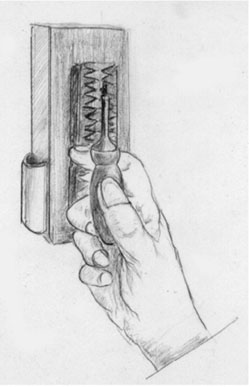
A flash came that gave us no time for counting. “That one,” said Grandpa, “hit the rock behind the house.” Dad unfolded himself as he entered the kitchen. He was careful because of the porcelain dish that hung down from the ceiling and served as a shade to the electric bulb. Mother took his wet jacket off and went to get some old dry clothes, while Aunt Valentine served him a bowl of hot soup.
tlc
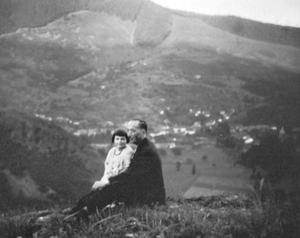
Dad started eating. He asked Uncle Germain for a cigarette even though, like everyone else, he vigorously condemned the young abbot who smoked secretly. On the wall was an electric fire lighter. At the very moment Dad went close to it to light his cigarette, a flash struck the apple tree in front of the house just next to the electric wire. Dad was thrown up to the ceiling. He landed on his back on the floor. Everyone shouted, “Adolphe, Adolphe!”
Aunt Valentine lit the candles. In the flickering light, Father lay on the floor looking whiter than chalk.
“He’s breathing,” said Aunt Valentine to Mum, who had just come back with dry clothes. Both sisters said, “Thank God.” Slowly Dad opened his eyes.
“Can you move your legs?”
He tried and they worked. Mine didn’t—I was paralyzed.
“I’m all right, just a little dizzy,” he said, and to prove it he got up, hung up his wet clothes and drank the famous Sunday meat soup.
Another flash made us all tremble, but the next one hit the other side of the valley. The rainfall weakened. In the garden, the plants, overloaded with water, were tired and were lying down for a rest. Grandma came out of her hiding place, went to the holy water basin, and made the sign of the cross. “We have escaped fire with all that warm, fresh hay upstairs,” she said.
The meal tasted even better after the heavens had been appeased. Grandma made a cross with her knife on the fresh loaf of bread before cutting big slices. Outside, the trees slowly emerged from the fog like phantoms.
“Girls, if you want to play, you may go to the attic,” said Grandma. Going to the attic was a treat—there we could get away from the boring conversation about the strike.
“First I want another piece of cake,” demanded Angele. And she got it! My mother would have turned a deaf ear to me had I asked for it that way! “Ladies never say ‘I want...,’” Mum told me, “They say ‘I would like.... ’”
The stairs to the attic were in a corner of the house. To the right, in the attic, some hay was stored. To the left, just above the dining room, was the chest with all the precious souvenirs with which we could play. Voices, cigarette smoke, and the smell of coffee rose up to us through the floor. We emptied a part of the trunk that had old dresses, and we played with cups and plates from the last century.
We heard Grandma’s voice from below: “If we were Germans, we wouldn’t have any strikes! On the other side of the Rhine River, no one strikes!”
“Remember,” Grandpa answered his wife, “when Adolphe’s mother was a leader in the very first socialist strike, we were Germans.”
“That was before the Great War, but now, under Hitler’s leadership, Germans have work and good pay. They are prosperous.”
The rain returned, hammering on the roof. Downstairs they drank more coffee and some liquor—homemade sweet wine for the women but a strong drink for the men.
Grandma started complaining again. “Adolphe, it’s because of the French and their allies that German money has lost its value, not because the Germans are lazy! The French are lazy,” she asserted. “They are slow, unorganized . . .” She was talking and talking—only there was no argument because no one replied.
“Mother, it would be fairer of you if you read other newspapers also, not only one kind that speaks for Germany,” someone said.[3]
“Simone! Angele! Come down from the attic. It’s not raining anymore.”
Someone suggested that we take advantage of the sunshine. We all went out. But as soon as we came to the crossroad, Grandpa, looking up to the mountain top, said, “We’d better stay near the house.”
We walked up toward the end of the meadow, where Uncle Germain had installed a wooden bench and planted three pine trees at the edge of the cliff.
It was too wet for anyone to sit down, but from that place we could see the whole valley: Krüth, where Dad was born; Oderen, our village; Fellering, with its two churches—the Catholic church in the middle of the village and, at the outskirts, a Protestant church.
I asked Grandma what was the difference between the churches. “Protestants are enemies of Catholics.”
“Girls, you’d better go on your way.” Grandpa pointed to the violet-colored clouds.
“Yes, and you see that fog?” added Grandma. “It’s coming up—that means that it will come down again as rain. If you hurry, you can catch the earlier train and avoid getting drenched.”

The first thing Mother did when she arrived home was to cut some flowers from our garden “to put life in the place.” Red and yellow dahlias in the gray and blue Alsatian clay vase started our city life on a familiar note again.
“Simone, let’s prune the petunias on the balcony.”
“Mum, look! My sugar is gone!” I had left a sugar cube on the balcony before we had gone to Grandma’s.
Mother smiled. “Did the stork take it?”
“Yes,” came the answer from the other balcony. The voice belonged to one of our neighbors—Mrs. Huber—who added, “They’re gone. You’ll have to wait for your little sister or little brother. The stork will return in the spring and may bring a baby for you.”
Here in Mulhouse, the storks bring the babies, but, in Wesserling, babies choose their mothers by hiding in a big cabbage. But here in Mulhouse, cabbages never have babies, they only have worms! I knew a baby would come. I was sure of it because I had chosen the best mother in the world! I wanted a baby brother or sister so badly.
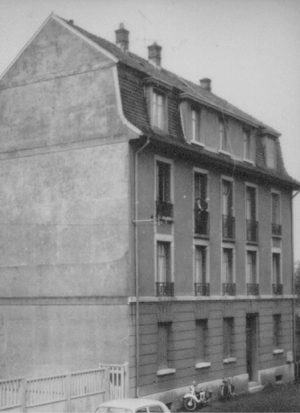
Once in a while, other children came around. Mr. Eguemann, a neighbor, had two grandchildren who visited sometimes. “Take the dog downstairs and play with them,” Mum would say. “They can be your younger brother and sister.”
But I wasn’t comfortable with them. Their grandfather made mean eyes toward me every time he saw me, ever since the day I had caught him stealing. It was early one morning. Mother had asked me to bring up the bread and the milk. Every family would hang up a basket and a pot with the money for the milkman and baker in the entrance of the house—eight baskets for our apartment house. When everyone was still sleeping, the milkman with his carriage pulled by two dogs, and the baker with his harnessed dog, would fill each one’s basket according to how much money had been left. That morning, I caught Mr. Eguemann with his hand in somebody else’s basket.
But we managed to have a good time, Mr. Eguemann’s grandkids, Zita, and I. We were so involved in playing that I didn’t hear Mother call me for supper. The following day it happened again.
“Now listen to me,” she warned. “Again I called you three times. What will people think? ‘Mrs. Arnold’s child is disobedient, and Mrs. Arnold is weak and cannot make the child obey her!’” With dark eyes amid serious wrinkles, she added slowly, “If this happens again tomorrow, then we’ll have to deal with you like we do with Brumel the cow.” After a long silence, she said, “Woe to you if I have to call a third time!”
I was downcast and hung my head. Would Mum treat me like Brumel? She had never spanked me before; neither had Dad. But I knew she had the authority. She might do it.
I was sure of one thing—Mum meant what she said—and obedience was especially important now that I was a big girl—I was six years old! So when the supper call came, I had to be ready.
The following day when Mother called me, I hurried to gather my toys. They were spread all over the place. The second call came. I started for the house when one of the little girls ran in front of me and fell, her elbow bleeding. We both started crying. Then the third call came. I left the little girl there and ran upstairs terror stricken. The door was open, and I saw the Ping-Pong paddle lying on my bed. I turned white. Before I knew what was happening, Mum took me by my sweater to my room, stretched me out on the bed, took off my panties, and without a word paddled me firmly. As she went out, she said, “As soon as you’re finished crying, you may come and eat your soup. If you wait too long, it will be cold.” I stayed face down, crying and sobbing. The worst was the shame of my bare buttocks and the pain in my heart because she didn’t know that I had been ready to obey!
I heard the doorbell ring. It was Mr. Eguemann, demanding that I be punished in front of him for pushing down his granddaughter. I was terrified. Mother answered with a very firm voice, “Mr. Eguemann, punishment is my business, not yours!”
“Your child had better not play with my grandchildren anymore!” he threatened.
Now, Mother figured out what had happened and why I had not answered her supper call. She came quietly in my room, turned me around gently, and sat down next to me.
“I’m so sorry that I made a mistake. I feel very bad about it. Will you forgive me?” My mother was asking me for forgiveness— that stopped the tears! “Come eat your soup, I’ll heat it for you.” Even though my buttocks were still burning, I felt much better. And with Dad at work, I had Mum all to myself.
Usually after supper, Mum would spend some time with me. She’d have me come to the little room my parents proudly called “the salon.” There was only enough space for the green couch and the armchair, and a half-moon table leaning against the wall. A big orange silk lampshade, mother’s handiwork, gave a warm sunset light. The door had been removed in order to put a stove in the left corner. Next to it was a shelf with a globe and a radio. In the hallway, a mirror above the small table reflected the bouquet of dahlias, the balcony window, and the lampshade. It doubled the size of our tiny, cozy family room. Zita would lie at the very spot where Dad usually put his feet while reading or when “traveling” by using the map.
What a day it had been! I had learned the importance of obedience and respect. I had learned how humble Mother was; she acknowledged her misunderstanding and asked me to forgive her. That event taught me a lesson, one that would be valuable later in my life.
I was a happy little girl by the time Mum tucked me in bed. Her deep-blue eyes, her tender kiss, and her last words, “Good night, my treasure,” made it a memorable day.




